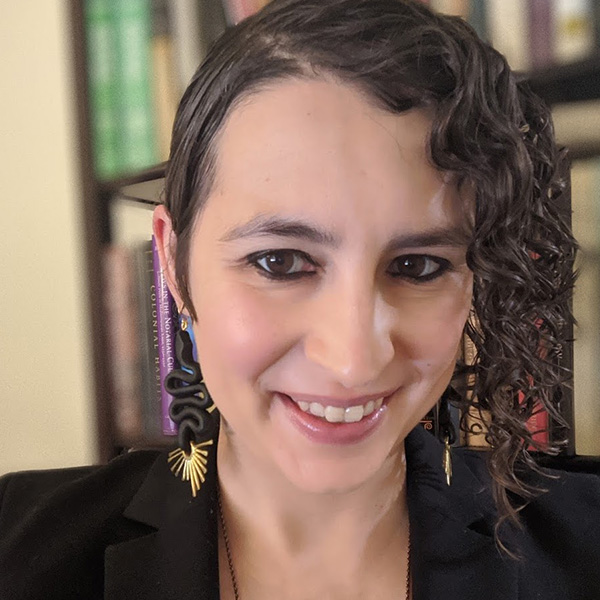Teaching
I teach a wide array of courses on the global Middle Ages, many of which encompass both Europe and the Middle East, and incorporate the lived experiences of Jews, Christians, and Muslims. Through my teaching, I seek to expose students to the diverse experiences of people of different ethnicities, religions, and genders in the medieval world—and combat the perception of medieval history as the story of white, male, Christian elites. In my classes, students learn to closely and critically read a varied collection of primary sources, including both written sources (economic contracts, personal letters, court cases, literary texts, chronicles, saints’ lives, law codes) and visual materials (painting, manuscript illumination, tapestry, sculpture, architecture). I ask students to engage with real medieval voices—as well as to consider which voices remain absent from our texts and why—in order to better understand mentalities and social norms as well as pivotal historical moments. My classes also incorporate film, television, and historical fiction novels related to the medieval past, in order to address directly how modern uses and misuses of medieval history shape popular understandings of the period.
Research
I am a social historian, which means that I am invested in reconstructing and understanding the everyday lived experiences of ordinary people. In particular, I seek to center the experiences of marginalized people in the medieval world, and to explore how gender, social status, and religious identity structured legal and social norms for medieval men and women. My research focuses on the medieval Mediterranean, a region that is both especially fascinating for the study of interfaith contact and conflict and particularly richly documented.
My first book, The Fruit of Her Hands: Jewish and Christian Women’s Work in Medieval Catalan Cities (Pennsylvania State University Press, 2022) is a social and economic history of women’s work in three Catalan cities—Barcelona, Girona, and Vic—between 1250 and 1350. It explores how gender and religious identity intertwined to shape the labor options available to Jewish and Christian women in the medieval Mediterranean. Jewish women, I find, played a far more circumscribed role than their Christian counterparts in most economic sectors. The Fruit of Her Hands exposes the limitations of historical narratives that emphasize a shared, inter-religious Mediterranean culture. Even while embedded in an economy and society that necessitated interfaith encounters, religious communities employed gender roles to construct cultural difference. The Fruit of Her Hands received the 2024 La corónica International Book Award.
I am currently working on two new book projects. The first, tentatively titled Between Laws: Legal Culture, Gender, and Jewish Identity in the Medieval Mediterranean, 1250-1492, will delve into Jews’ engagement with Christian legal culture, through a study of Jewish family law contracts drawn up by Christian notaries in Catalonia, Italy, and southern France. This book will consider the different ways in which Jewish men and women manipulated Christian legal norms, as well as how crises like massacres, forced conversions, and expulsions transformed Jews’ relationship to Christian legal culture. The other project is an intersectional study of the link between gender and anti-Judaism in medieval western Europe.
I am also deeply interested in medievalism—how modern people use medieval history to speak to contemporary concerns, and to construct how we see both our present selves and our past. Since 2018, I have addressed these issues in my public history podcast Media-eval: A Medieval Pop Culture Podcast. I am also working on an article, “Invisible Jews and Jewish Monsters: Jews and Jewishness in Medieval-Inspired Films,” which explores the erasure of medieval Jews in most films, and the interrelated phenomenon in medieval-inspired fantasy of monstrous and magical creatures that draw heavily on long-standing anti-Jewish stereotypes.
Life Outside Work
I grew up in the Maryland suburbs of Washington, DC, and have since lived in Pennsylvania, New York, Connecticut, and Indiana before moving to Memphis in the summer of 2020. For many years, my second home has been Barcelona, where I have spent many summers. My travels (for research, conferences, and fun) have also taken me to England, Ireland, France, Andorra, Israel, Italy, Greece, Turkey, the Czech Republic, Austria, Hungary, and Poland. I have a passion for languages and have studied (and can speak or read to varying degrees) Catalan, Spanish, Latin, Hebrew, French, German, Italian, and Arabic. When at home, I occupy myself with reading, listening to podcasts, elaborate cooking and baking, and spending quality time with my dog and cat.
Follow me on Twitter:
Personal: @sarahifftdecker
Podcast: @mediaevalpod
Selected Publications
Books
The Fruit of Her Hands: Jewish and Christian Women’s Work in Medieval Catalan Cities (Pennsylvania State University Press, 2022)
Jewish Women in the Medieval World, 500-1500 CE (Routledge, 2022)
Articles and Book Chapters
“The Widow and the Notary: Death, Gender, and Legal Culture in the Jewish and Christian Communities of Medieval Catalonia,” Journal of Medieval Iberian Studies 16:1 (2024): 103-120.
“Credit and Connections: Jewish Women Between Communities in Vic, 1250-1350.” In Women and Community in Medieval and Early Modern Iberia, edited by Michelle Armstrong-Partida, Alexandra Guerson, and Dana Wessell Lightfoot, 17-40. Lincoln: University of Nebraska Press, 2020.
“Between Two Cities: Jewish Women and Exogamous Marriage in Medieval Catalonia.” Journal of Medieval History 45:4 (2019): 481-503.
“Jewish Divorce and Latin Notarial Culture in Fourteenth-Century Catalonia.” In Boundaries in the Medieval and Wider World: Festschrift in Honor of Paul Freedman, edited by Thomas Barton, Susan McDonough, Sara McDougall, and Matthew Wranovix, 45-60. Turnhout, Belgium: Brepols, 2017.
“Jewish Women, Christian Women, and Credit in Thirteenth-Century Catalonia.” The Haskins Society Journal 27 (2016): 161-178.
Book Reviews
Review of The Christian Jew and the Unmarked Jewess: The Polemics of Sameness in Medieval English Anti-Judaism, by Adrienne Williams Boyarin. Jewish Historical Studies: A Journal of English-Speaking Jewry 55:1 (2024): 315-318.
Review of Women and Economic Power in Premodern Royal Courts, ed. Cathleen Sarti. Speculum 97:3 (2022): 885-886.
Listen to Dr. Sarah Ifft Decker on The Provost's Podcast:
Education
M.A., The Jewish Theological Seminary, 2011
B.A., Swarthmore College, 2009
